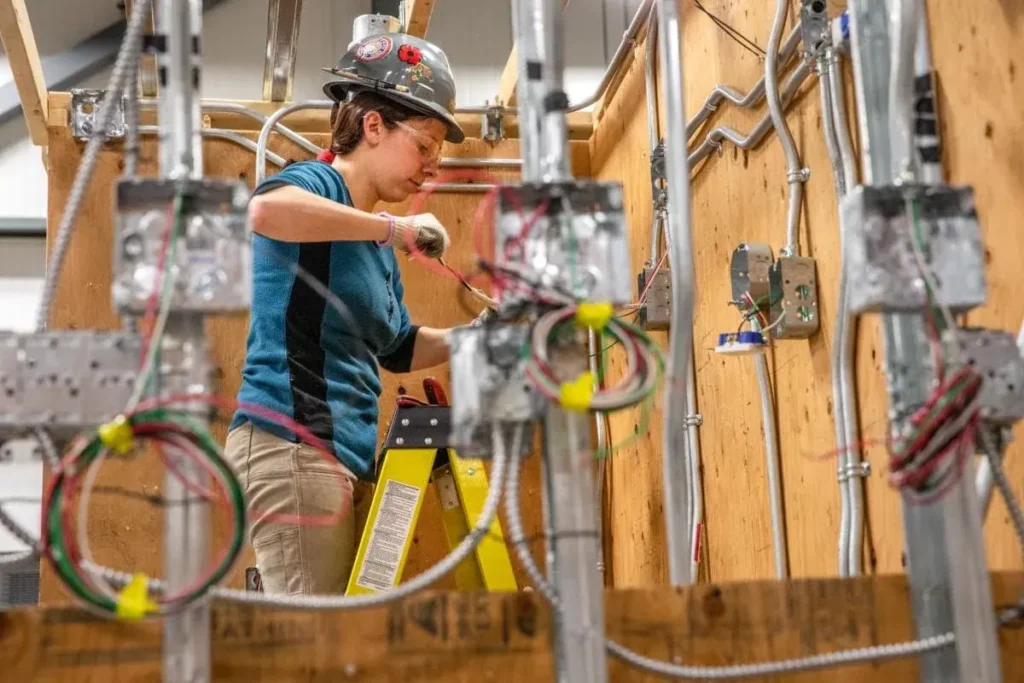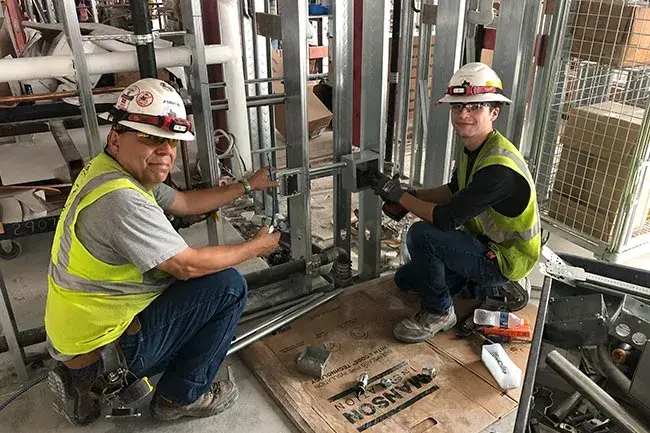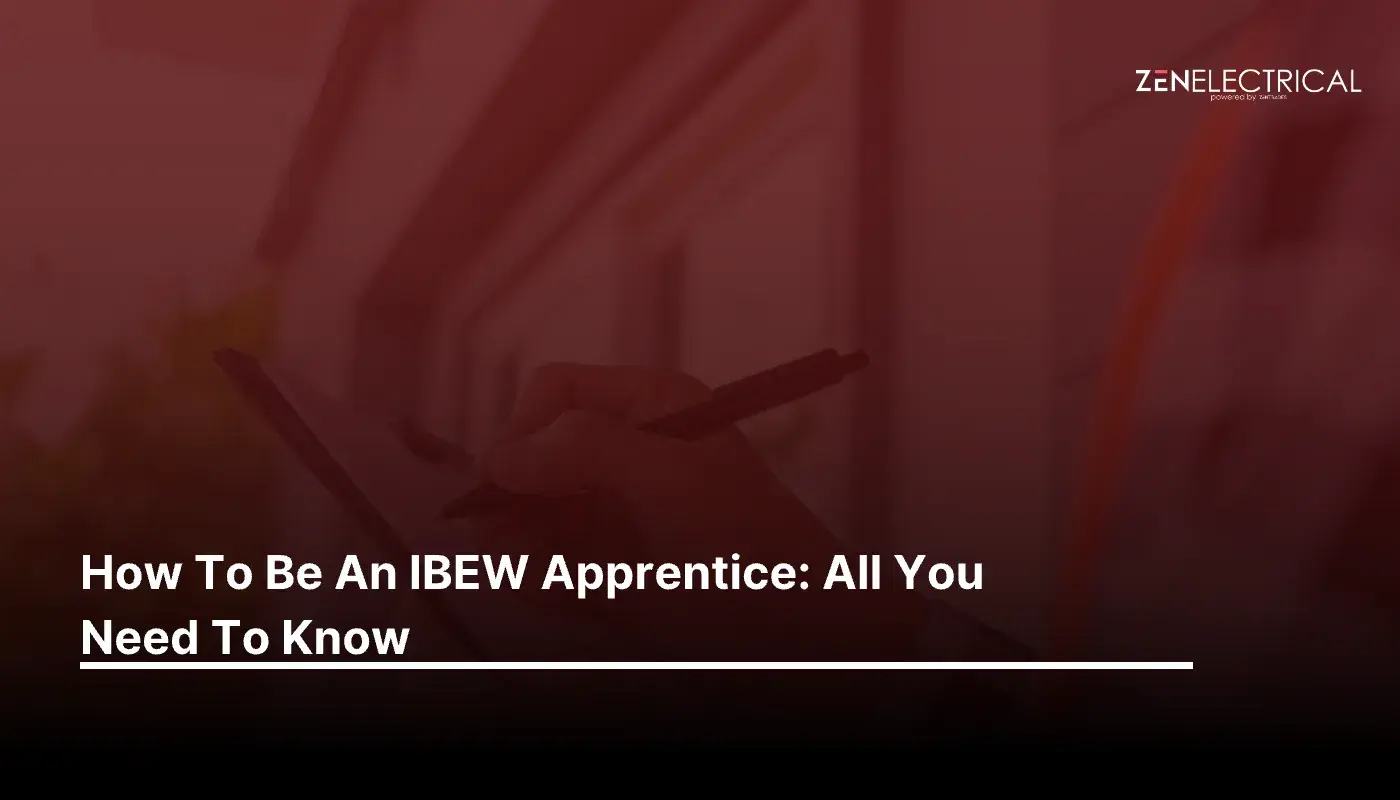How To Be An IBEW Apprentice: All You Need To Know
- ZenElectrical
- 9 Min Read
Whether in your 20s or your late 30s, becoming an electrician is never too late! And you can further excel at it to build a solid career path that pays you enough to keep your life running smoothly. Creating a strong base is extremely important because the topics will get more complex as you level up, and you might find it difficult to cope.
That is why a good apprenticeship program ensures that you have a strong base, the right electrical training program, and adequate theoretical classroom instruction hours. Many apprenticeship programs offer top-notch training and certification courses, but among them, the top three in the US are the Electrical Training Alliance (ETA), Associated Builders and Contractors (ABC), and Independent Electrical Contractors (IEC).
Alternative options to apprenticeship programs, many aspiring electricians consider getting into trade or vocational schools for electricians. However, weighing all the pros and cons and collating suggestions from fellow electricians – it is clear that the pros of getting into an apprenticeship program weigh more than any training program at a trade or a vocational school. And more specifically, getting into the IBEW electrical.

Here What We Cover
Covering The Basics: Union Electricians
Union electricians are a part of the electrical trade, working as professionals. They are members of unions such as the IBEW (International Brotherhood of Electrical Workers). The goal of the union is to ensure fair pricing and treatment along with standard professional growth for all workers. Being in a union makes you a part of the collective group that negotiates competitive wages, benefits, and working conditions to avoid the under-compensation of workers in the electrical industry and provide for themselves a rewarding career.


Use our free estimate template now
Make winning quotes in minutes—for any industry and any job.
Introduction To IBEW
The International Brotherhood of Electrical Workers (IBEW) was established in 1891, considering the poor working conditions of electrical workers at the time. They experienced extremely low-paying projects that required double the hard work.
That is when this institution came into existence to tackle such issues.
In today’s time, IBEW is the largest electrical labor union, representing over 77,500 workers. The majority of members are workers in the electrical industry, but they also include members from broadcasting, manufacturing, telecom, etc.
What Is the National Electrical Contractors Association?
The National Electrical Contractors Association (NECA) represents the electrical contracting industry. It represents contractors involved in various aspects of electrical work. NECA offers various electrical training programs and certification courses to help contractors stay updated with industry trends. It supports businesses of various sizes and collaborates with IBEW to create labor agreements with the union’s workforce.
What is the Electrical Training Alliance?
Formerly known as the National Joint Apprenticeship and Training Committee (NJATC), the Electrical Training Alliance offers different apprenticeship programs. ETA is a partnership program between IBEW and NECA dedicated to developing education in the electrical industry and providing adequate job-site training to all members of both organizations. This body aims to provide the electrical industry with skilled and trained professional workers.
Apprenticeship programs offered by ETA allow apprentices to earn while learning and getting trained in their respective fields. They receive hands-on, on-the-job training along with theoretical classroom instruction classes that aid in making them adept at their jobs. This allows aspiring professionals a robust career path and gives them the opportunity to earn greater pay, work on big projects, and make a name for themselves.
Types Of Apprenticeship Programs Offered By ETA
Electrical Training Alliance offers various types of apprenticeship programs. In most programs, apprentices are assigned to contractors for a full-time training program. They substitute with a new contractor every year to diversify their work experience.
Types of apprenticeship programs offered:
Inside wiremen
Outside linemen
VVD installer technicians
Residential wiremen
Eligibility Criteria For Apprenticeship Program
To get into the IBEW Apprenticeship program, you need to fulfill certain non-negotiable requirements. Most of the programs have the following basic requirements:
at least 18 years of age
high school diploma or GED or equivalent
proficiency in high school algebra
with a valid driver’s license and transportation
pass a drug test
Get posts like this in your inbox.
Keep learning how to run a 5-star business with our bi-weekly newsletter.
Application Process For IBEW Apprenticeships
To apply for the apprenticeship program, below is a step-by-step guide to ensure a smooth procedure.
Step 1: Find the nearest IBEW
Locate the nearest IBEW local. Check out their website and contact them for any information you need, such as the programs offered, the duration, the eligibility criteria, and the procedure to get into their apprenticeship programs.
Step 2: Choose the relevant program for you
IBEW can offer various apprenticeship programs, so you must be clear on what training you require to reach your goal. Check out the various programs IBEW Local offers and decide on the most suitable option for you. They provide programs for different electrician types, so if you want to work as a residential electrician, choose the residential wireman apprenticeship program instead of the inside or outside linemen program.
Step 3: Draft your application
After you have located the nearest IBEW and decided on the apprenticeship program you want to move forward with, the next would be to start preparing your application. You’ll need documents to verify your identity and qualifications. You can contact your IBEW local to know about their specific requirements. However, generally, some basic documents that you might need are:
high school certificate
birth certificate
drivers license
drug test certificate
vehicle insurance or ownership certificate
It’s recommended to keep these essential documents prepared and ready to go to avoid last-minute hassle.
Step 4: Prepare for the aptitude test and interview
After submitting your application for the apprenticeship program, the next step is to start preparing yourself for the Electrical Training Alliance (ETA) Aptitude test. The test consists of 69 questions in algebra and reading comprehension and has a time limit of 96 minutes. So make sure you prepare yourself well and ace the test, as your oral interview is dependent on it.
Within two to four weeks, you will receive your test scores, and if your performance is satisfactory, you will move to the next part of the testing process, which is the oral interview. The oral interview happens before a panel of IBEW and NECA representatives and can be intimidating to some. Hence, robust preparation is imperative to keep calm and ace your interview.
Step 5: Gear up for your apprenticeship program
if your aptitude test and interviews go really well and according to the standards, it’ll be easier for you to get ahead in the queue of apprenticeship candidates. If you don’t pass your test on the first attempt, don’t be disheartened; it can take more than one try to get there. Apprenticeship programs at IBEW can be challenging and competitive; hence, attempting for a second or third time can showcase that you are really committed to getting yourself trained in the field, which can act as an add-on for you.
Once you get selected for the program, it’s imperative that you work there and train yourself adequately to get the most out of it. As mentioned before, getting into these programs can be competitive, so don’t take it for granted.

How Vital Is It To Get Into A Pre-Apprentice Program?
Even though pre-apprenticeship programs can increase the chances of getting into the respective apprenticeship programs and also provide a pathway to reach mid-level expertise without a full-fledged apprenticeship. However, the pay, benefits, and expertise may not be equivalent to the standards of an actual apprenticeship program.
Some apprenticeship programs offer pre-apprenticeship programs along with them, which can be beneficial for showcasing expertise and commitment to your respective field. But it’s not really necessary, as attending just the apprenticeship program can prove enough.
At the end of the day, it all depends on the requirements of the IBEW local and the local union. So, make sure that you gather all the information you need to make an informed decision.
Conclusion
No matter a person’s age, an apprenticeship through the IBEW offers a truly rewarding path to a stable and lucrative life as an electrician. In all, it is through a sound, rigorous apprenticeship program that one would be able to gain the necessary knowledge base, along with the practical experience needed for success. From the quality training received, such as what can be offered by the Electrical Training Alliance, to the vast amount of support and materials available from the IBEW for both apprentices and journeymen alike, aspiring electricians are truly geared for success within their trade.
Whether you begin through a pre-apprenticeship program or directly in an apprenticeship, the outcome will be the same—equipping yourself with the skills and qualifications to be successful as an electrician. Union electricians benefit through collective bargaining by enjoying competitive wages with excellent benefits and a good working environment. The IBEW has a rich history and a rather big network; both play a crucial role in offering a path to growth and professional development, offering an advantage over any alternative.
From choosing a program to the interview and aptitude test preparation, the road to becoming an IBEW apprentice is paved with several months of rigorous planning and preparation. Keep focused, seek guidance from your local IBEW, and be sure to tap every possible resource that could help in your application. By working hard, you will firmly establish yourself in a very rewarding electrician career and be satisfied with the stability and opportunities that a prestigious institution like IBEW can equip you with.

Explore a better way to grow your business. Book a free demo now!
Get organized, win jobs, and wow customers.
Book A Free Demo with ZenTrades Today!
Related Reading
Why Your Field Software Management Software Needs QuickBooks Integration
ZenTrades Why Your Field Service Management Software Needs QuickBooks Integration Read More Request Demo...
Read MoreZenTrades How To Manage Electrical Service Agreements Like...
Read MoreZenTrades The Best 5 Jobber Alternatives In 2023...
Read More


